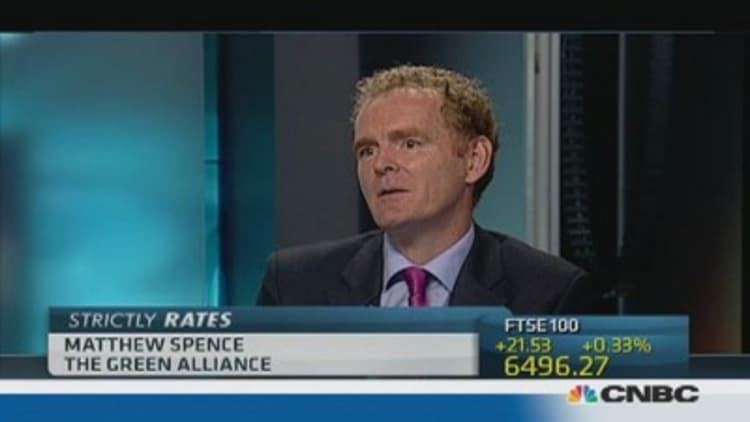In a speech last week, the Secretary General of the Organization for Economic Cooperation and Development (OECD) had a message for oil and gas investors: Their biggest risk isn't a spill or a blowout or a storm. And for countries deriving a large portion of revenue from oil and gas, it isn't the U.S. shale boom's competing with OPEC.
Rather, it is stranded assets in a carbon-entangled world, according to OECD Secretary General Angel Gurría.
It's also the biggest risk for any investor exposed to fossil fuels. The Asset Owners Disclosure Project estimates that an average 55 percent of pension fund portfolios are in high-carbon assets or sectors with major exposure to that sector.
Stocks in companies such as Exxon Mobil and BP are staples of such portfolios because of their slow-growth, dividend-rich profile, yet few investors ever consider those companies' having to write off assets as "stranded" underground.
"The looming choice may be either stranding those assets or stranding the planet," Gurría said.
(Read more: Rich kids and their Greenpeace portfolios)
Though his speech made news, Ben Caldecott, who runs the Stranded Assets program at Oxford University's Smith School of Enterprise and the Environment, said the topic wasn't new.
"Stranded asset risk has been quickly introduced to mainstream investors, and people are starting to understand the issues," he said.
Understanding doesn't mean embracing the idea in investment valuation and analysis, though.
"The reality is that corporations and investors don't have very much foresight on these issues," Caldecott said. "They misprice these risks and don't generally incorporate them into decision-making. Very few parts in the investment chain are factoring in these issues."
Gurría's remarks ask the audience to imagine Exxon Mobil, sitting on 40 gigatons of hydrocarbons by some estimates—the company says it has a total resource base of 87 billion barrels of oil equivalent—having to write off projects around the world. Exxon Mobil is in involved in an increasingly far-flung dash for new resources, which are increasingly more expensive and dangerous to extract, and investors complain about the lack of production growth from the largest U.S. oil company.
In addition, he said, OECD governments make about $200 billion annually from oil and gas. Russia gets about $150 billion a year, or 28 percent of total government revenues, while OPEC countries revenues total $600 billion to $700 billion a year.
This "carbon entanglement" not only is a threat to the global economy but is a primary reason it is so difficult to move the world away from carbon, Gurría said.
"Stranded assets are now being talked about by major opinion makers like the OECD," said Michael Lazarus, senior scientist at the Stockholm Environment Institute. Sovereign wealth funds, governments and investors are "really not preparing to strand assets—they're doing the exact opposite."
(Read more: Libya could become an oil paradise: Eni)
Exxon Mobil spokesman Alan Jeffers referred questions about carbon risk to the disclosure within the company's annual 10-K about greenhouse gas emissions.
When asked about how it related to stranded assets, Jeffers said, "Our risk factors are not specific to the concept of stranded carbon assets, but every credible energy outlook indicates that fossil fuels make up the majority of energy demand for the foreseeable future. ... Energy needs and environmental needs have to balanced ... but there's no technology available today that will replace oil, gas and coal."
European majors BP and Royal Dutch Shell have spoken publicly about performing carbon price analysis on their operations. The general outlook in Exxon, Shell and BP's long-term global energy forecasts is that the biggest result of the carbon challenge will be greater reliance on natural gas.
Caldecott said the past five to ten years in the energy markets has shown that those betting on their ability to predict the future of the energy market decades out may be the ones engaging in wishful thinking.
In fact, Gurría addressed the status quo energy outlook in his speech.
"For heavily coal-dependent countries, a switch to shale gas can reduce the carbon intensity of power generation [as in the USA]," he said. "This is an improvement from a climate perspective. ... It will mean lower emissions, but not no emissions. The question then becomes: How do you ensure that gas is a transitional step toward an eventual goal of zero emissions? If we invest too much in dedicated pipelines and other infrastructure, the transition risks becoming a new and permanent dependency."
ConocoPhillips declined to comment. Chevron and BP did not respond to requests for comment.

An investor can always make the case that global carbon legislation would never happen—just look at the failure of the Kyoto Protocol, for example. Even experts agree, to an extent.
"This is the challenge of the whole carbon bubble rubric," Lazarus said. "You have to take the threat seriously to start talking about stranded assets, and there are different extents to which different institutions accept these concerns and price them in."
Julie Gorte, senion vice president of sustainable investing at Pax World Management, said, "To make assets stranded, you need to have a carbon price that is high enough, first for coal, second for oil, and last for natural gas. Cap-and-trade or a carbon tax would do it, but it would need to be global, and we're far from that—and Congress can't pass anything."
Experts say, though, that it's a mistake to think of stranded assets as applying only to carbon or as hinging on legislation. For example, Caldecott said, declining costs for renewables will have more impact over time than a global climate change agreement.
Gorte said that looking at how quickly the coal market has deteriorated as a result of the rise of natural gas—a rise no one predicted a decade ago—is an example of how quickly markets can change and assets become stranded.
(Read more: The 'best' unstable emerging market)
The broad issue for investors is to think about all the companies and sectors that could be affected by climate change, and the potential market mispricings range from agriculture to utilities.
There's now a tool to help investors determine how great their exposure to stranded assets may be.
New on the Bloomberg terminal is a stranded assets valuation calculator. It lets investors stress test the cash flows and valuations of companies and portfolios based on carbon constraints, and will help them understand where their portfolio is exposed to and affected by carbon. If emissions have to fall by X percent by 2017, what is the impact on ExxonMobil, and how does it affect cash flow and valuation?
And it's just the beginning, a first step is making stranded asset calculations a core metric in financial analysis, said Caldecott, who worked closely with Bloomberg on the project.
"It won't just be about carbon," he said, but will look at other resource issues, including water.
Even if an investor does not believe that legislative change on a global basis is possible related to carbon, stranded assets must be part of risk management.
Jonas Kron, senior vice president and director of shareholder advocacy at Trillium Asset Management, said its energy analyst recently completed an exam of energy industry and tar sands exposure as a way to pull the stranded assets concept into the firm's investment process.
"I want to be very clear that I haven't come here to vilify fossil fuels," Gurría told the OECD meeting. "We don't need to get to zero tomorrow. Not even in 2050. ... But sometime in the second half of the century we will need to arrive there. Carbon entanglement will not be easily undone."
As an investor, you might want to make sure it doesn't undo you.
—By Eric Rosenbaum, CNBC.com





